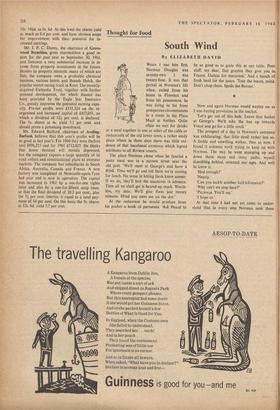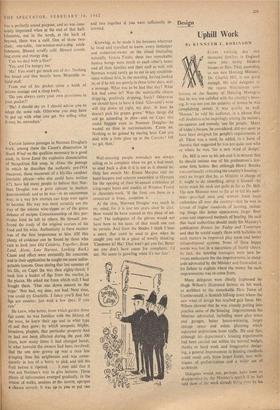Thought for Food
South Wind
By ELIZABETH DAVID
WHEN I met him first, Norman Douglas was
The place Norman chose when he fancied a pasta meal was in a narrow street near the old port. 'We'll meet at George's and have a drink. Then we'll go and tell them we're coming for lunch. No sense in letting them know sooner. If we do, they'll boil the macaroni in advance. Then all we shall get is heated-up muck. Worth- less, my dear. We'll give them just twenty minutes. Mind you meet me on the dot.'
At the restaurant he would produce from his pocket a hunk of parmesan. 'Ask Pascal to be so good as to grate this at our table. Poor stuff, my dear, that gruyere they give you in France. Useless for macaroni.' And a bunch of fresh basil for the sauce. 'Tear the leaves, mind. Don't chop them. Spoils the flavour.'
Now and again Norman would waylay me as I was buying provisions in the market.
'Let's get out of this hole. Leave that basket at George's. We'll take the bus up towards Vence and go for a little stroll.'
The prospect of a day in Norman's company was exhilarating; that little stroll rather less so. A feeble and unwilling walker, then as now, I found it arduous work trying to keep up with Norman. The way he went stumping up and down those steep and stony paths, myself shambling behind, reversed our ages. And well he knew it.
'Had enough?'
'Nearly.
'Can you tackle another half-kilometre?'
'Why can't we stop here?'
'Pazienza. You'll see.'
'1 hope so.'
At that time I had not yet come to under- stand that in every step Norman took there
was a perfectly sound purpose, and so was inno- cently impressed when at the end of that half- kilometre, out in the scrub, at the back of beyond, there was a café. One of those two- chair, one-table, one-woman-and-a-dog estab- lishments. Blessed scruffy café. Blessed crumb- ling crone and mangy dog.
'Can we deal with a litre?'
'Yes, and I'm hungry too.'
'Ha! You won't get much out of her. Nothing but bread and that beastly ham. Miserable in- sipid stuff.'
From out of his pocket came a hunk of saiame sausage and a clasp knife.
'Do you always carry your own provisions in your pocket?'
'Ha 1 I should say so. I should advise you to adopt the same rule. Otherwise you may have to put up with what you get. No telling what it may be, nowadays.'
Certain famous passages in Norman Douglas's work, among them the Count's dissertation in South Wind on the qualities necessary to a good cook, in Siren Land the explosive denunciation of Neapolitan fish soup, in Alone the passage in which he describes the authentic pre-1914 macaroni, those macaroni of a lily-like candour (enviable phrase—who else could have written it?), have led many people to believe that Nor- man Douglas was a great epicure in matters gastronomical; and so he was—in an uncommon way; in a way few mortals can hope ever again to become. His way was most certainly not the way of the solemn wine-sipper or of the grave debater of recipes. Connoisseurship of this par- ticular kind he left to others. He himself pre- ferred the study of the original sources of his food and his wine. Authenticity in these matters was of the first importance to him. (Of this plenty of evidence can be found by those who care to look into Old Calabria, Together, Siren Land, Alone, Late Harvest, Looking Back.) Cause and effect were eminently his concerns; and in their application he taught me some unfor- gettable lessons. Once during that last summer of his life, on Capri (he was then eighty-three), I took him a basket of figs from the marketjn the piazza. He asked me from which stall I had bought them. 'That one down nearest to the steps.' Not bad, my dear, not bad. Next time, You could try Graziella. I fancy you'll find her figs are sweeter; just wait a few days, if you can.'
He knew, who better, from which garden those figs came; he was familiar with the history of the trees, he knew their age and in what type of soil they grew; by which tempests, blights, invasions, plagues, that particular property had or had not been affected during the past 300 Years, how many times it had changed hands, in what lawsuits the owners had been involved; that the son now grown up was a man less grasping than his neighbours and was conse- quently in less of a hurry to pick and sell his fruit before it ripened. . . . I may add that it was not Norman's way to give lectures. These pieces of information emerged gradually, in the course of walks, sessions at• the tavern, apropos si chance remark. It was up to you to put two and two together if you were sufficiently in- terested.
Knowing, as he made it his business wherever he lived and travelled to know, every innkeeper and restaurant-owner on the island (including naturally, Gracie Fields; these two remarkable human beings were much to each other's taste) and all their families and their stall as well, still Norman would rarely go to eat in any establish- ment without first, in the morning, having looked in; or if he felt too poorly in those latter days, sent a message. What was to be had that day? What fish had come in? Was the mozzarella cheese dripping, positively dripping, fresh? Otherwise we should have to have it fried. 'Giovanni's wine will slip down all right, my dear. At least he doesn't pick his grapes green.' When things did not go according to plan—and on Capri this could happen even to Norman Douglas—he wasted no time in recriminations. 'Come on. Nothing to be gained by staying here. Can you deal with a little glass up at the Cercola? Of we get, then.'
* Well-meaning people nowadays are always telling us to complain when we get a bad meat, to send back a dish if it is not as it should be. Only last month Mr. Ernest Marples told the hotel-keepers and caterers assembled at Olympia for the opening of their bi-annual exhibition of icing-sugar buses and models of Windsor Forest in chocolate-work, `If the food you have in a restaurant is lousy, condemn it. . .
At the time, Norman Douglas was much in my mind, for it is just ten years since he died. How would he have reacted to this piece of ad- vice? The inelegance of the phrase would not have been to his taste, of that much one can be certain. And from the Shades I think I hear a snort, that snort he used to give when he caught you out in a piece of woolly thinking. 'Condemn it? Ha! That won't get you far. Better see you don't have cause for complaint, I'd say. No sense in growling when it's too late.'


































 Previous page
Previous page